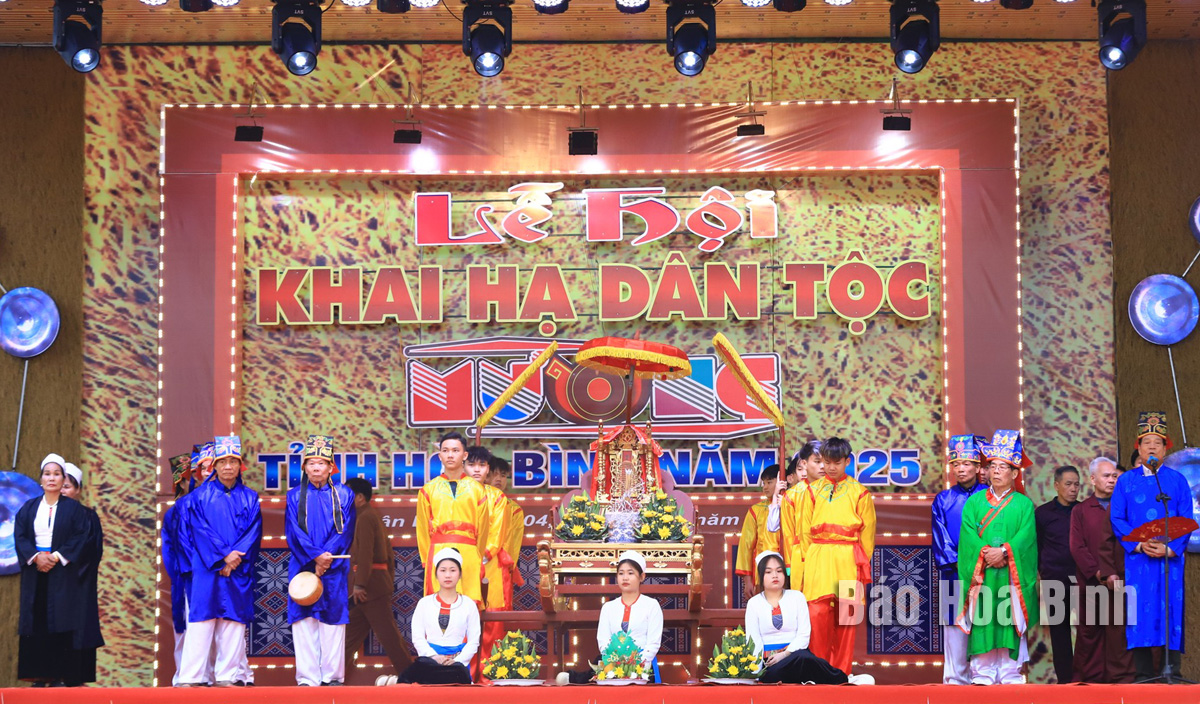Hoa Binh province, renowned as the cradle of the Muong ethnic group and the celebrated Hoa Binh Civilisation, boasts rich and distinctive cultural heritage. Numerous local traditions and cultural assets have been recognised as part of the national tangible and intangible cultural heritage.
The annual Khai
Ha Festival of the Muong ethnic group in Hoa Binh is a significant cultural
event aimed at fostering patriotism and national pride, and raising public
awareness about preserving and promoting the national cultural identity.
President Ho Chi Minh used to strongly emphasise the
importance of safeguarding the nation’s cultural heritage. According to him,
preserving and promoting cultural values must be based on respecting and
inheriting the achievements of previous generations. He advocated cherishing
and bringing into play positive cultural values while resolutely rejecting
harmful cultural influences and outdated customs. He also pointed out the need
to concurrently upholding the cultural identity and acquiring cultural essence
of the world.
Giving attention to cultural heritage
preservation, at its fifth session, the 8th-tenure Party Central Committee
issued a resolution on "building and developing an advanced Vietnamese
culture deeply imbued with the national identity", emphasising the
preservation and promiotion of cultural heritage as a key mission. At its ninth
session, the 11th-tenure Party Central Committee issued another resolution on
"building and developing the Vietnamese culture and people to meet the
country’s sustainable development goals", further stressing the need to
mobilise the entire society's efforts to uphold and bring into play traditional
cultural values.
At the National Cultural Conference in November
2021, then Party General Secretary Nguyen Phu Trong underscored the importance
of preserving and promoting traditional cultural values, embracing global
cultural quintessence, while enhancing the quality and effectiveness of new
cultural value creation. Building a healthy and civilised cultural environment
must go hand in hand with resolute efforts to combat negative, unethical, and
anti-cultural elements, and safeguard the values of truth, goodness, and
beauty.
President Ho Chi Minh's viewpoints and the
Party's guidelines have been applied creatively and effectively by Hoa Binh's
Party organisation, administration, and people of all ethnic groups to help
develop an advance culture deeply imbued with the national identity.
In recent years, Hoa Binh has made significant
strides in perfecting the policies and legal framework related to cultural
heritage. The province has actively takenconcrete actions and solutions
to implement national strategies, programmes, and projects dedicated to
protecting and optimising cultural heritage. As a result, public awareness of
cultural heritage and the importance of preservation efforts has improved
considerably.
A landmark step in this direction was the
issuance of Resolution No. 04-NQ/TU by the Standing Board of the provincial
Party Committee on October 11, 2021, which outlines tasks to preserve and
promote cultural heritage values of local ethnic groups from 2021 to 2025, with
a vision toward 2030. It aims to ensure effective preservation and promotion
while embedding cultural values into community life, fostering cultural
exchange to enrich ethnic cultural identities, and leveraging cultural heritage
for sustainable tourism and socio-economic development.
Nguyen Van Toan, Standing Vice Chairman of the
Hoa Binh provincial People's Committee, said the province has prioritised
developing plans and projects to preserve and promote traditional cultural
values of ethnic groups. These efforts have yielded positive outcomes, with
greater awareness about the significance of cultural heritage among local Party
committees, administrations, and the public.
Innovative approaches have been adopted,
including the establishment of folk culture and arts clubs, along with
initiatives to teach traditional folk songs, crafts, and the Muong gong art.
These efforts have been widely embraced by local communities.
The "All people unite to build cultural
life" movement, linked to building new-style rural areas and civilised
urban areas, has also gained strong public support. Investment in cultural
facilities has improved public spaces, meeting people's cultural demand and
enhancing community bonds.
Recognising and honouring individuals who
safeguard and practice cultural heritage has further inspired efforts to
preserve these invaluable traditions. Hoa Binh has actively identified and
catalogued significant heritage sites, and also mobilised resources to restore
and turn them into tourist attractions. Revolutionary historical sites have
become important landmarks for educating younger generations about the
country’s proud history.
Currently, 70% of the province's intangible
cultural heritage elements were recognised at the national level, with ongoing
efforts to secure UNESCO recognition for the Mo Muong cultural practice as
intangible cultural heritage of humanity in need of urgent safeguarding.



